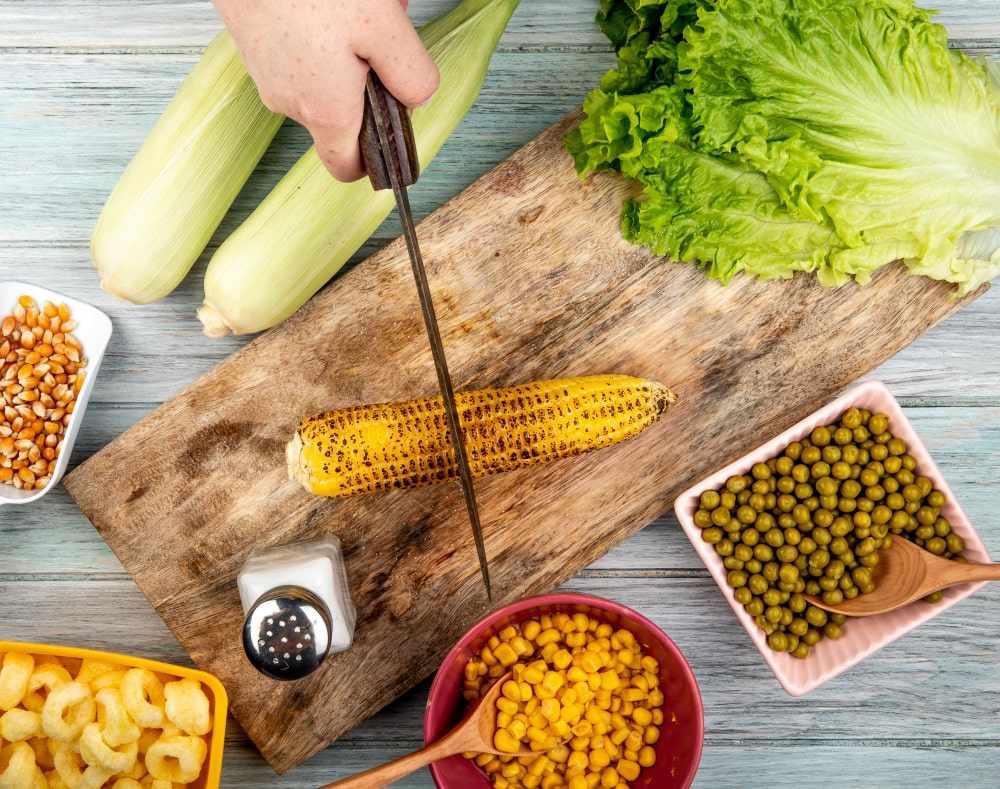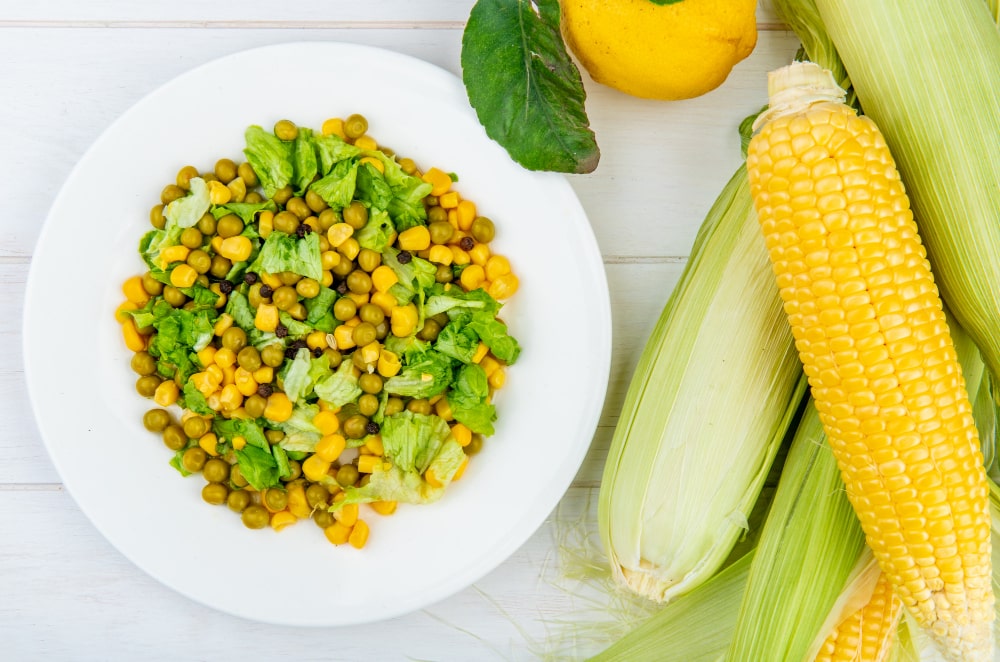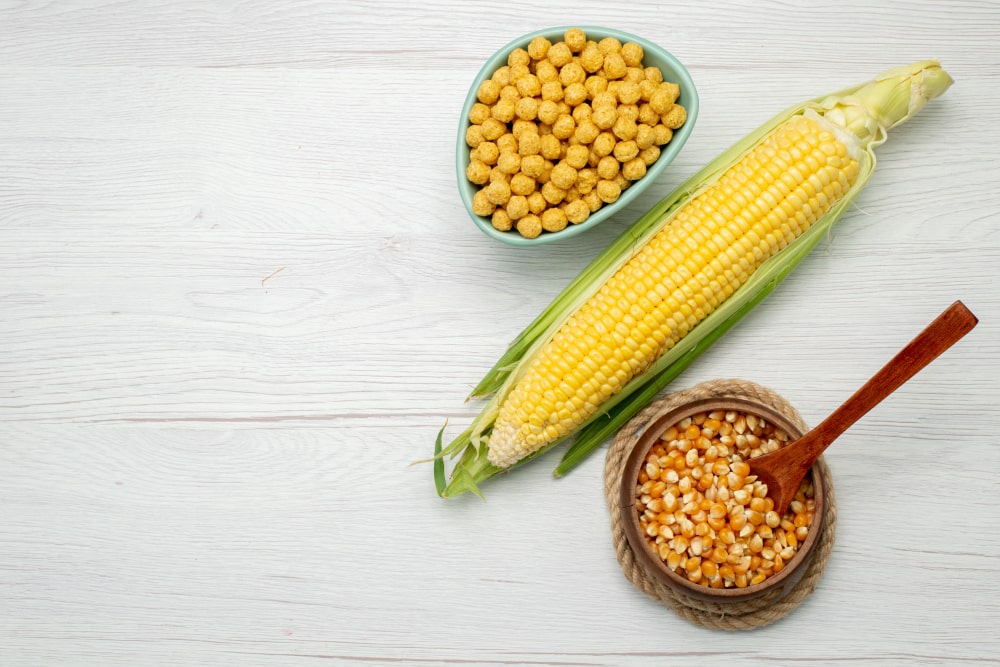Weight loss is a journey that requires dedication and an understanding of nutrition. Eating well is key to success, and some foods may be more beneficial than others when it comes to weight management. One food that has been gaining attention in recent years is corn. But what role does this grain play in the world of weight loss? In this article, we will take a look at the nutritional composition of corn, is corn good for weight loss, and what considerations should be taken into account when incorporating this food into your diet.
What is Corn?
Corn (aka maize) is a cereal grain that is commonly used as a staple in many different cultures across the world. It belongs to the grass family and is one of the most widely grown crops on the planet. Corn has a high nutrient content and is a great source of carbohydrates, protein, fiber, vitamins, and minerals.
Nutritional Composition of Corn
Corn is very rich in energy-providing carbohydrates such as starch (around 72% by weight) and simple sugars such as glucose (4%). It is also a good source of dietary fiber, providing around 3g per 100g. Corn contains 8g of protein and small amounts of fat per 100g. It provides important B vitamins such as thiamin, riboflavin, folate, and niacin, along with essential minerals like phosphorus, potassium, magnesium, and zinc.
Different Types of Corn
Corn comes in many different forms and varieties, including whole-grain cornmeal, grits, masa harina (which is used to make tortillas), hominy, polenta, and popcorn. The type of corn you choose will depend on the recipe or specific dish. For example, popcorn and hominy have a higher starch content than whole-grain cornmeal or polenta.

Read More: Healthy Carbs for Weight Loss: A Nutritional Guide
Is Corn Good for Weight Loss?
1) Fiber Content in Corn
The high fiber content of corn can be good for weight loss as it slows down digestion, which helps keep you feeling fuller for longer periods of time. This is especially helpful when trying to maintain a caloric deficit in order to lose weight. Fiber also helps feed the beneficial bacteria in your gut, which can improve digestive health and reduce inflammation.
2) Low in Calories
Corn is low in calories and contains only around 86-120 kcal per 100g, depending on the variety. This makes it a great choice for those looking to reduce their caloric intake in order to lose weight.
3) High Satiety Index
The high fiber content of corn can also help boost its satiety index, which is how quickly a food makes you feel full and satisfied. The higher the satiety index of a food, the less likely you are to overeat, as it will keep you feeling full for longer.
4) Nutrient Density
Corn is packed with vitamins and minerals, which makes it a great source of nutrient density. This means that you get a lot of nutrition in each serving, so even if eating corn doesn’t necessarily help you lose weight, it can still provide essential nutrients to your diet.
Read More: Best Oatmeal for Weight Loss: Everything You Need To Know
Potential Benefits of Corn for Weight loss
Regulation of Blood Sugar Levels
Corn is high in carbohydrates, which can cause a spike in blood sugar levels if eaten in excess. However, the fiber content helps to slow down digestion and the absorption of glucose into the bloodstream, which can help regulate your blood sugar levels. This means that you can benefit from the energy-providing carbohydrates in corn without experiencing any of the negative effects associated with high blood sugar levels.
Digestive Health and Corn
The fiber content in corn helps to promote a healthy digestive system by increasing the amount of beneficial bacteria in your gut, which can help reduce inflammation and improve digestion. Corn can be beneficial for weight loss as it can help reduce bloating and water retention, making it easier to achieve a toned physique.
Antioxidants in Corn
Corn also contains antioxidants, which can help protect your cells from damage caused by free radicals. This can help your body’s natural healing processes and potentially aid in weight loss.

Read More: Are Pickles Good for Weight Loss? A Comprehensive Guide
Considerations and Caveats
Moderation is Key
It’s important to remember that moderation is key when it comes to incorporating corn into your diet for weight management. Eating too much corn can lead to an increase in calories, which can be counterproductive if you’re trying to lose weight. It’s best to eat only small amounts of corn at a time and focus on the other components of your diet as well.
Portion Size Matters
The size of your portion matters when it comes to incorporating corn into your diet for weight loss. A single serving should be about ½ cup (50g) or less, depending on your caloric needs and body type. Eating too much corn can lead to weight gain, so it’s important to be mindful of your portion sizes.
Preparing Corn for Optimal Health Benefits
When preparing corn for weight management, it’s best to opt for whole-grain varieties such as polenta or grits. These are more nutrient-dense and have a lower glycemic load than other types of corn, so that they won’t cause a spike in your blood sugar levels. It’s also important to avoid adding too much fat or sugar when cooking with corn, as this can cause the calorie content to increase significantly.
Potential Allergies or Sensitivities
If you have a corn allergy or sensitivity, it is best to avoid eating corn altogether. Even if your allergy or sensitivity is mild, it’s important to be aware of potential reactions that could occur upon consumption. If in doubt, speak to your healthcare provider before introducing corn into your diet.
Read More: 12 Best Fruits for Weight Loss: A Comprehensive Guide
Corn in Different Diet Plans
1. Low-Carb Diets
While corn is a source of carbohydrates, it can still be included in low-carb diets as long as you eat it in moderation and watch your portion size. It’s important to focus on complex carbohydrates such as whole grains (e.g., polenta or grits) rather than simple sugars like corn syrup.
2. Low-Fat Diets
Corn is naturally low in fat and can be a great source of complex carbohydrates for those following a low-fat diet. As with any other food, it’s important to watch your portion size and avoid adding unhealthy fats when cooking with corn.
3. Vegan and Vegetarian Diets
Corn is a great choice for vegans and vegetarians as it is a plant-based food that provides essential vitamins, minerals, and fiber. It also contains some protein, making it a great addition to any vegan or vegetarian diet.
4. Corn in Plant-Based Diets
Corn is a great choice for those following a plant-based diet as it is rich in fiber, vitamins, and minerals. It can also provide some protein and carbohydrates, which are essential for optimal health. As with any other food, it’s important to watch your portion size when consuming corn in order to avoid overeating.
5. Ketogenic Diet
Corn can be a part of a ketogenic diet, provided that you watch your portion size and eat it in moderation. As with any other food, choose complex carbohydrates such as whole grains (e.g., polenta or grits) instead of simple sugars like corn syrup. Additionally, make sure to focus on other sources of healthy fats, such as nuts or avocados, instead of adding unhealthy fats when cooking with corn.
Read More: Is Salmon Good for Weight Loss? Benefits, Connection & More
Corn Recipes and Meal Ideas for Weight Loss
1) Corn and Avocado Salad
This light and refreshing salad is perfect for a summer day. The creamy avocado pairs perfectly with the sweet corn, while the lime juice provides a bright and zesty flavor.
Ingredients:
- One can of corn, drained and rinsed
- One avocado, diced
- 1/2 cup red onion, diced
- One jalapeno, seeded and diced
- Two limes, juiced
- Salt and pepper to taste
Instructions:
- In a large bowl, combine the corn, avocado, red onion, and jalapeno.
- Squeeze the lime juice over the mixture and season with salt and pepper.
- Toss to combine and serve chilled or at room temperature.
Read More: 15 Best Essential Oils for Weight Loss: How to Use It & Benefits
2) Grits Bowl
This hearty bowl is perfect for a cozy breakfast or dinner. The creamy grits provide an excellent source of complex carbohydrates, while the kale adds a dose of vitamins and minerals.
Ingredients:
- 1 cup grits
- 2 cups vegetable broth or water
- 1/4 teaspoon salt
- Two tablespoons of butter or vegan butter substitute
- 1/2 cup kale, chopped
- Hot sauce (optional)
Instructions:
- In a medium saucepan, bring the vegetable broth or water to a boil.
- Slowly whisk in the grits and season with salt.
- Reduce heat to low and let simmer for 10-15 minutes, stirring occasionally.
- Add the butter or vegan butter substitute and stir until melted.
- Fold in kale and cook for another 5 minutes.
- Serve with a dash of hot sauce (optional). Enjoy!
Read More: Vitamins That Help with Weight Loss: Everything You Need to Know
3) Creamed Corn with Spinach
This comforting side dish is perfect for a dinner party. The creamy corn base pairs nicely with the sweet onion, while the spinach adds a dose of vitamins and minerals.
Ingredients:
- Two tablespoons of olive oil
- 1/2 cup sweet onion, diced
- One can of creamed corn or 2 cups kernels cut off the cob
- 1/4 teaspoon salt
- 2 cups spinach, roughly chopped
Instructions:
- Heat olive oil in a large skillet over medium heat.
- Add onion and cook for about 4 minutes until softened.
- Stir in creamed corn or kernels, cut off the cob, and season with salt.
- Cook for another 3 minutes and add spinach.
- Cook until the spinach has wilted, and serve. Enjoy!
4) Corn and Black Bean Tacos
These flavorful tacos are perfect for a weeknight dinner. The sweet corn pairs perfectly with the smoky black beans, while the creamy avocado provides balance and texture.
Ingredients:
- 4 ounces of corn (about 1/2 cup)
- 8 ounces cooked black beans (1 can drain and rinsed)
- One tablespoon of olive oil
- 1/4 teaspoon chili powder
- Salt and pepper to taste
- 6 small flour or corn tortillas, warmed
- One avocado, diced
- Lime wedges (optional)
Instructions:
- Heat olive oil in a large skillet over medium heat.
- Add the corn and black beans and season with chili powder, salt, and pepper.
- Cook for 5 minutes and remove from heat.
- Assemble tacos by spooning the corn mixture into each tortilla, followed by a few cubes of avocado.
- Serve with lime wedges (optional).
Read More: High Carbs Diet Weight Loss: The Guide to Shedding Pound
Conclusion
In conclusion, corn can be a great addition to any diet plan when consumed in moderation. Whether you’re following a low-carb, low-fat, vegan, or vegetarian lifestyle, there are plenty of delicious recipes and meal ideas featuring corn that will help you reach your weight loss goals. Be sure to focus on complex carbohydrates such as whole grains, avoid simple sugars like corn syrup, and always keep portion size in mind. With a bit of creativity, you can make any meal featuring corn both healthy and delicious!
FAQs
Yes, eating corn can help with constipation as it is a great source of both dietary fiber and water. Aim to include whole grains such as polenta or grits instead of simple sugars like corn syrup in order to make the most of its health benefits. Additionally, be sure to drink plenty of fluids throughout the day to promote regularity.
Yes, corn can be part of a low-carb diet as long as you watch your portion size and choose complex carbohydrates such as whole grains instead of simple sugars like corn syrup. Keep in mind that one cup of sweetcorn has about 25g of net carbs, which is more than the recommended amount for a low-carb diet. It’s best to enjoy it in moderation and focus on other sources of carbohydrates, such as leafy greens or whole grains.
Yes, corn can be a great option for people with diabetes and high cholesterol as it is rich in dietary fiber, which can help to stabilize blood sugar levels and lower bad cholesterol. Make sure to focus on complex carbohydrates such as whole grains instead of simple sugars like corn syrup, and watch your portion size. Additionally, eat plenty of other foods that are high in fiber, such as fruits, vegetables, and legumes, to further help balance your blood sugar levels.

